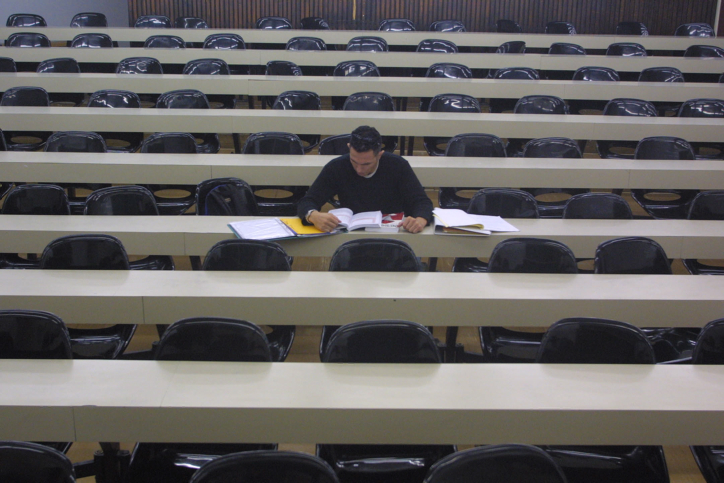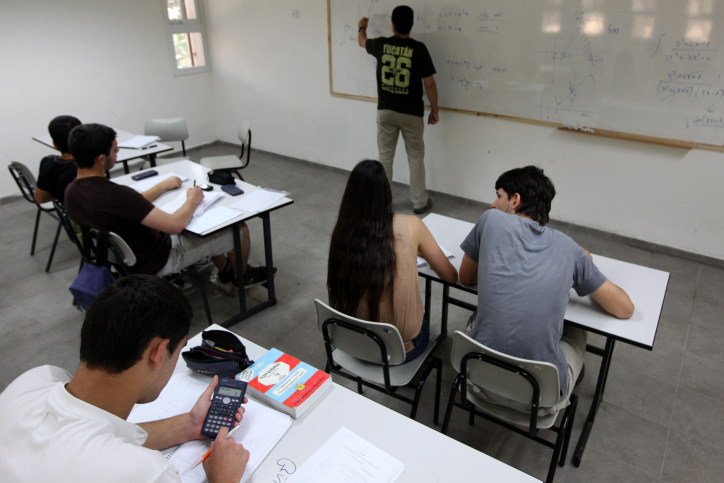In his effort to promote ‘meaningful learning’, Education Minister Shai Piron is gutting academic excellence and concrete achievment.
Education Minister Piron’s plan to abolish half of the state high school matriculation exam complement is coming in for withering criticism · Education Ministry senior officials are afraid for the core subjects, teachers are worried about the future of technological majors, and universities are losing faith in the high school exam system itself · While Israeli schools focus on “meaningful learning”, excellence, success and achievement are shunted aside

After more than a month of the Israeli Education Ministry promoting its new reform, there is not a student who hasn’t memorized the slogan: “Israel is moving up a grade – we’re moving to meaningful learning.” All that’s left is to figure out how to implement the reform and what exactly is the “non-meaningful” learning that needs to be discarded.
Piron’s answer to these questions is simple: cutting down the number of high school matriculation exams, a crucial part of the required achievements to enter universities. As he explained in an interview to Israeli TV channel 10:
We’re raising a generation of students […] measurement has become the God of learning. We’re raising students for whom excellence is a grade. And here we come to the teacher and saying: hang on […] ask research question, give the student personal accompaniment, will become a model to identify with.
As the Minister laid out in the interview, he wants in the future to reduce the number of matriculation exams to only four. For the meantime, he’s sufficing with a more modest reduction, as seen here in the following table taken from the reform website:
| Subject | Today | After Proposed Change |
| Number of external examination events for students doing 21 study units (about 30% of students) | 15 | 10 (30% reduction) |
| Number of external examination events for students doing 30 study units (about 30% of students) | 17 | 11 (35% reduction) |
| Number of external examination events for students doing 41 study units (about 30% of students) | 22 | 11 (50% reduction) |
Reform documents don’t state which exams will be cut out, but the table does make one thing clear: the result will indeed be very equal. All students will have 10-11 exams, and they can choose only one major for which they can take an external exam. As always when it comes to equalizing, those who suffer are the gifted students who until now took 22 exams. The present reform cuts their exams and learning material by half.
A serious blow to exam reliability
Although the ministry hasn’t published a list of subjects yet, the rumors and leaks have everyone on edge. Teachers and senior educators who spoke with ‘Mida’ voiced great concern, and everyone’s afraid for subjects which may be cut entirely from the curriculum.
“School grades can’t be trusted. They’re seriously distorted,” a senior Ministry official told ‘Mida’. “Everyone knows about the serious problem of cheating in the system, which exists with external exams as well. Since schools strive to show that their students have high grades, they can’t be trusted as a supervisor. It’s known that the situation with internal tests is far worse. Reliance on school grades is unthinkable.”
According to the official, the change needs to address something else entirely. “There are now 159 subjects which students can be tested on in school, including cooking, cosmetics and hair design. It’s ridiculous and unprecedented throughout the world. The Education Minister needs to cancel the right to be tested in many of these subjects. But unfortunately, the reform doesn’t deal with this.”
According to him, aside from cutting down the number of subjects, gifted students should not be limited in the number of scientific or technological subjects they can take: “There are a large number of students who take a large number of subjects. These are the scientists of the future, and it’s unthinkable that they should be restricted to just one subject.”
In the humanities, the reform combines a number of subjects in a rather artificial and strange manner. History and civics will be merged into one exam, as will literature and language. According to the official, this is an outrage: “It’s unthinkable that civics teachers will check history exams and vice versa. These are two entirely different subjects based on separate corpuses of knowledge. The same goes for language and literature: because the language level of students today is beneath contempt, instead of cutting down on tests, they should add one, such as ‘Hebrew composition’ which was cut out a few years ago.”

Breaking the Thermometer
If senior officials are concerned about the reform, teachers in the field are downright terrified, especially when it comes to the technological track. This track is based on an exam of 15 scientific study units, and with the total exams now limited to 11, it is in danger of being shut down entirely.
Yossi Yaron, a programming engineer with an MA from the Technion, decided to leave a lucrative high-tech career three years ago to fulfil his dream of teaching computer programming in schools. According to him, such studies are very important: “Today, anyone who wants advance in the field of engineering, the hard sciences or technology has to have a reasonable grasp of programming. It’s no secret that there’s a great shortage of programmers. You can’t learn programming in high school and go out and start a high-tech career right away, but it gives kids enough of a taste to know if they’re interested and certainly gives them the tools to continue.”
Yaron admits that the technological track needs changes, but not the kind Piron is promoting. “This is a difficult track which includes exams on three scientific subjects on the level of five units per subject, and many students are buckling under the strain. It could be that their options should be expanded. But the Education Minister decided to go the easy route, and replace an external test in one subject and replace it with an internal test. How does that solve the problem? Instead of curing the disease, he breaks the thermometer. What does an internal test mean? It means tons of pressure on the teachers from the administration, parents and students – and in the end, the grade is worthless as far as the universities are concerned. You can toss it in the garbage. So what’s the point?”
Ruthi, a computer science teacher at a technological school, also tells of the difficult atmosphere among teachers: “There’s a feeling that the higher-ups in the Education Ministry aren’t really in touch with the field and don’t pay enough attention to our complaints,” she says. “Teachers today are experiencing great uncertainty about the future of the subject they’re teaching.” As a veteran computer science teacher, she feels helpless. “If the test is internal, why should the students work at all? How do we convince our students that by us, grades are for real, when his friend in a neighboring school gets a 100 so the school can inflate its record?”
In the meantime, Yaron has decided to pull up his sleeves and try to reverse the evil decree: first he sent Minister Piron a letter describing the dangers of the reform, and recently he’s been collecting teachers’ signatures for a petition to apply more pressure from below.

For academia, it’s back to entrance exams
Technion Chemistry Professor Ehud Keinan believes Minister Piron has good intentions, but in his experience Piron’s ability to change the system is very limited. Keinan knows the system well – as the Chair of the Committee for the subject of chemistry for the past few years, he’s worked hard to strengthen science education in the schools and to make it accessible to as many students as possible, especially those on the country’s periphery. According to him, “the system is paralyzed because there are so many political forces each trying to pull things in their direction, and the result is complete paralysis. The Education Ministry needs to be closed, razed to the ground, and only then try and rebuild something new.”
Keinan believes there’s a great deal of truth in the idea of meaningful learning. “Obviously today, when information is available to everyone, the purpose of the teacher is not just to pass information along but also embed it in the students, make them curious and turn them into different people.” But good intentions are not enough, he says. “Today, there’s a great shortage of science teachers, to a great extent because the Ministry is unsuccessful in attracting and properly rewarding talented people in this field. Most teachers can’t implement meaningful learning because they’re just not built for it. Without the right people, things won’t get done. It all begins and ends with the level of the teachers.”
When it comes to abolishing the matriculation and psychometric exams, Keinan is even sharper. According to him, it’s very difficult to trust internal grades: “There are schools whose grades we trust and those we don’t, because we notice students who got in because of their high grades, but quit in the first year because it’s too hard for them. The desire to give teachers and principals more freedom is important, but it may open the system up to exploitation and the complete devaluing of the grades they give.”
Without matriculation or psychometric exams, what will the institutions of higher learning do? To Keinan it’s clear that “the Technion and other institutions will have to develop new metrics, or go back to entrance exams for each course. We don’t want to go back to those days, but we may have no choice.”
No response was received from the Education Ministry by the time this article was published.
English translation by Avi Woolf.
To receive updates on new articles in English, join Mida on Facebook or Twitter or join our mailing list.



